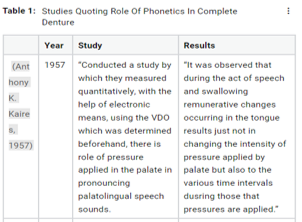Abstract
Speech, as formulated, perceived and decoded, is unique to humans. Speech is a learned process which makes use of the anatomical structures designed primarily for deglutition and respiration. The production of sounds requires selective modification and control of an outgoing air stream, which originates from the respiratory apparatus. Speech is a very sophisticated autonomous and unconscious activity. Speech in matured man in a learned habitual neuromuscular pattern which makes use of anatomical structures designed primarily for respiration and deglutition. Because oro-dental morphological features also may influence an individual speech, the dentist should therefore recognize the possible role of prosthetic treatment on speech activity. The loss of teeth and supporting structures alters the main articulatory cavity and produces a marked effect on the speech pattern proportionate to the location and magnitude of alterations. An empiric approach to the phonetic factor in denture construction frequently places the burden for compensating for speech changes for the adaptability of the tongue. Additionally significant is the fact that the speech mechanism is highly susceptible to degenerative diseases. If dentures are to contribute effectively to the functions of speech, dentists should utilize studies in the speech science field to augment their clinical knowledge of the phonetic factor in denture construction.
Full text article
Authors

This work is licensed under a Creative Commons Attribution-NonCommercial-NoDerivatives 4.0 International License.

